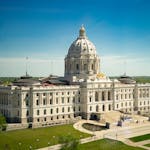Since his assassination 50 years ago, in 1968, the Rev. Martin Luther King Jr. has become almost universally admired in American society as a model of courage and dignity. Not coincidentally, he is now seen as much less threatening and disruptive to the status quo than he was in reality.
Yet during last weekend's Super Bowl, corporate America learned that King's legacy is not infinitely malleable. As Dodge discovered through immediate and widespread social media blowback following its commercial for Ram trucks featuring King, he was a prophet speaking truth to power — not a pitchman for the auto industry.
As we prepare to commemorate the 50th anniversary of his death this spring, it may be a good time to take stock of other aspects of King's legacy — elements that, judging from the content and tone of our current public discourse, may be fading from view.
First, King's faith was inseparable from his public witness. King was a Christian leader, make no mistake, and there is no point in trying to separate him, or any aspect of his public leadership, from his faith.
King's moral framework was not some vague, platitude-driven appeal to feel-good sentiments. He did not run from nor water down who he was or what he believed. Instead, he relied on the full power and scope of his own faith tradition to distill the essence of a foundational truth about the human condition.
King focused on the restoration of relationships — on what he referred to as "the beloved community" — appealing to a widely accessible moral vision that was not dependent on any particular religious revelation or ideological agenda. It was a basic reminder not to ignore what we know about ourselves: We are social creatures who are accountable to the demands of love and justice.
This truth was grounded in King's commitment to the Christian story, a story that gave him a starting place at which to anchor his discernment of injustice, and his commitment to remedying it. Faith was not out of bounds for King, but his faith was not invoked to shut down dissent or signal an us-vs.-them tribalism. King did not ask his listeners to embrace the religious foundations of his truth-telling (though many did); he asked them to embrace the resulting moral claims, regardless of how one arrived at them.
He brought his faith into the public square without a trace of embarrassment. But it was the beginning of the conversation, not the end of it.
Second, King's practice of Christian love did not make people — even his followers — comfortable. He challenged his followers to overcome their fears and refused the easy path of telling them what they wanted to hear.
Even within the black community of his own city, King showed that love is not passive — it pushes, it stretches. He worked to motivate the community to organize and persist in the Montgomery bus boycott, and he later wrote that the people, even though they were "exhausted by the humiliating experiences that they had constantly faced on the buses … came to see that it was ultimately more honorable to walk the streets in dignity than to ride the buses in humiliation."
King put his own being into the shoes of the other person, but he pushed that person to embrace a reality that may have laid beyond his or her view at the time. In loving others — friend or foe, black or white — King did the work that allowed him to see the world through others' eyes, but he insisted that they expand their view to encompass a truer, less isolated vision of their own well-being.
Third, King preached and practiced love for his enemies. He spoke often of the sacrificial love known as "agape," which focuses less on the lover's feelings for another and more on how the lover can meet the other's needs.
Loving the white man, according to King, was in part a response to the white man's needs, for the white man's personhood was greatly distorted by segregation, and "his soul greatly scarred." Agape insisted on the need to restore community even when some sought to break it. King's advocacy for equal rights was not a call to strengthen each person's independence and autonomy; it was a call to restore the relationships that were only possible when blacks and whites stood equal before the law.
His call to justice was deeper and broader than a call to lift up the oppressed. He sought to restore the relationships that were broken by oppression. Even his enemies were worthy of the beloved community.
We can all agree that, if the Rev. Martin Luther King Jr. were with us today, he would not be spending his time selling trucks. What remains unclear, though, is this:
If he stayed true to his prophetic message urging Americans to persist in the painstaking work of building the beloved community, would anyone be listening?
Robert K. Vischer is dean of the University of St. Thomas School of Law and author of "Martin Luther King Jr. and the Morality of Legal Practice: Lessons in Love and Justice."





!["Since the [Hennepin Healthcare System] Board took control in 2007, CEO pay increased by more than 142%. Meanwhile, that same board sunsetted employee](https://arc.stimg.co/startribunemedia/J7MD7DSJWMP3KYIYUSCQTABOAA.jpg?w=75&h=75&fit=crop&crop=faces)